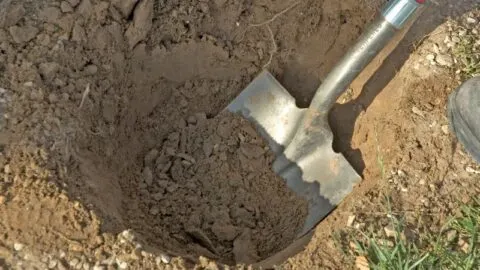Every landowner envisions an unlimited amount of freedom on their property. Especially for building, renovations, excavations, gardening, etc.
However, this might not be the case when digging in your backyard; interested in finding out why? Read below to learn more.
According to the law, you can only dig for five feet without a permit. Even so, you can only do this after informing the authorities by calling 811, a toll-free number. If you need to dig further, you’ll have to get a special permit after calling 811. The authorities then assess the area and grant the desired permission.
Do I Need A Permit to Dig in My Yard?

Although you might not always need a digging permit, it is compulsory when digging beyond the stipulated five feet.
This requirement also applies to any purpose and any part of your property. For instance, if you want to dig your back yard, front yard, or anywhere else.
Why is a permit important? It is because digging and excavation works are usually riskier than they seem.
Most settlements have some public utilities running beneath them, including:
- High and low-pressure gas pipelines,
- City waste drainages, etc.
- Electricity Cables
- Water Supply channels
- Telephone cables
- Communications cables
- Internet fiber optic Cables, etc.
Local building authorities must be aware to avoid the loss of lives and/or properties due to eventualities such as explosions.
By informing them of the intended depth you wish to dig to, they can warn against city utilities located underneath.
In addition, shoveling in the wrong direction could cause issues in the service delivery of public utilities. And a worst-case scenario might even include unknowingly causing a serious health risk to the community.
Usually, your local authorities would survey the property and map out notable areas. You will receive a go-ahead permit if it’s all good and fine.
If not, you’ll have to be content with knowing about the damage you and the authorities circumvented.
Is It Illegal to Dig a Hole?
Digging any deep hole is illegal without contacting your local authorities. Such activities include digging your backyard, especially when it’s beyond five feet.
Penalties range from a fine which might even be double what it costs to get a permit to even imprisonment.
Also, if caught, your project could be delayed till you provide a permit or even reversed. Such a verdict would waste efforts, time, and resources.
Recent statistics from the Common Ground Alliance (CGA) show that ¼ of all damages to public infrastructure are caused by unlicensed digging.
Hence it is now illegal to carry out any form of excavation on your property without informing the local building authorities.
So now, what does the legal permitting process involve? Below is a step-by-step compilation of how you can get a permit to dig when you want to carry out any underground activity.
- Visit the Common Ground Alliance site and select your state of residence. You can click here to access the site.
- Apply for a digging permit online. This application might also come with some upfront fees, which differ depending on the purpose of the digging. For instance, fees for a building are usually different from digging for maintenance.
- Submit your plans, drawings, and documents as requested.
- Wait for approval or respond to any review given where necessary. Here, the local authorities review your plan and assess the site against various requirements. They can then provide you with an official go-ahead or make alterations to your plan where necessary.
- Print your permit card.
- Then you can commence digging. Always ensure that you have a copy of your permit handy while working. Note that this process might take a few days to weeks depending on different factors, e.g., the state you live in, amendments necessary, etc.
Alternatively, place a call through to 811 and state your intentions.
Within three days, they would contact any local building authorities to physically assess your property and map out state utilities where present.
How Deep Can You Dig Without Calling 811?
While some states would allow a few inches to a limit of five feet, there is usually no uniform depth.
So instead, all landowners are always encouraged to call 811 or inform the local building authorities before digging.
These activities include seemingly harmless ventures like planting shrubs or small trees to building trenches or even fences.
Firstly, you must note that any activity that might require you to dig the earth comes with risks. This risk has to be well assessed by the appropriate authorities before you proceed.
Secondly, doing this helps preserve the conditions of state utilities which may be just close to the surface without your knowledge. So, it’s better to be safe than to be sorry.
Also, you should contact 811 at least three working days before you commence any digging activities. This time is to give room for any state utilities to be labeled.
Once you receive permission, ensure you dig with care. Furthermore, excavation must start within two weeks of the date on the 811 dig ticket. If this time elapses, you’ll need to get a new ticket.
How Deep Can You Dig on Your Property in Canada?
In Canada, local restrictions on digging may vary. These include restrictions like always contacting the authorities before digging in your backyard.
Or you own the property but not the mineral resources underneath it, etc. You must always place a call through before digging for the same reasons as the ones above.
The toll-free number to dial is 1-800-400-2255, and it is available 24/7. Alternatively, you may visit DigSafe Canada to consult a utility locator.
These authorities would help you identify underground infrastructures on the local property while ensuring they are safe for you.
How Deep Can You Dig into Your Property in the UK?
In the Uk, the laws concerning digging are different and more rigid. Residents are allowed to dig only up to 100 mm without a permit.
This depth is usually adequate for gardening activities and other routine maintenance. However, beyond activities such as the ones stated above, you’ll need to get a license known as the Permit to Dig.
Also, take note that you must obtain the Permit to dig when carrying out the following activities on your land:
- Digging beyond 100mm
- Installing Fence Post
- Installing Signposts
- Digging a trench hole
- Installing mailboxes
- Planting a new shrub bed
- Any form of excavation
A slight exception to the 100mm rule exists for owners carrying out routine maintenance on an existing shrub bed. In which case, they can dig up to 300mm without getting a new permit.
Conclusion
You cannot properly ascertain how deep you can dig unless you have contacted your local authorities.
Their assessments can save you from a potential hazard caused by cutting into a buried utility line.
It can also save you the cost of a fine or any other penalties that may arise from violating these rules or damaging state property.





